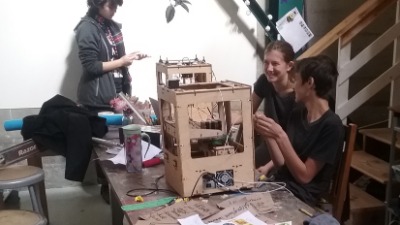Tinkering Studio
- United States,Bay Area, California
- 1980

| Time frame | |
| Categories | |
| Level of Schools | |
| External Partners | |
| Type of Schools | |
| URL | |
| Number of Schools involved | |
| Number of Schoolheads involved | |
| Number of Teachers involved | |
| Number of Students involved | |
| Number of Parents involved | |
| Number of External Partners involved |
The Tinkering Studio at the Exploratorium offers activities and workshops for playful invention, investigation, and collaboration for both children and adults, including parents. By creating inquiry-based experiences and tools that spark wonder; offer hands-on experiences; and encourage questions, explorations, and individual discovery, we are transforming the way that people learn. Teachers are supported in changing their classroom practices and collaborate with a high number of science-centers and museums to create similar offer in other places in the world.
They believe that learning is joyful and lifelong. By creating inquiry-based experiences and tools that spark wonder; offer hands-on experiences; and encourage questions, explorations, and individual discovery, we are transforming the way that people learn. Learning this way empowers people to figure things out for themselves about science, but also about any topic, claim, or idea. They also support teachers in changing their classroom practices and collaborate with a high number of science-centres and museums to create similar offer in other places in the world.
They offer their programmes in the Exploratiorium directly for children and for teachers.
- hands-on, inquiry-rich experiences for secondary science and math teachers.
- for secondary science and math teachers as well as school leaders’ inquiry-based professional development.
- activities and workshops for playful invention, investigation, and collaboration for both children and adults, including parents.
- educational resources supporting the implementation of the California Next Generation Science Standards.
801,465 Total Attendance 75,351 After Dark visitors 125,607 Total Field Trip visitors
74,925 Field Trip visitors with free admission
16,043 Membership Households
Having personal experience of their complex methodology and joyful approach. Probably the joy element makes it most outstanding, and this is transmitted to schools to make science education enjoyable there, too.
Complex approach to science, breaking down silos, collaboration with schools and local community, especially by offering services that makes science experience joyful for parents.
Their tinkering methodology is described in literature - doing science using everyday, simple materials.
Schools are offered methodology and support, but free to choose what they implement locally.
Exploratorium evolves using experiences from implementation, but the most important mutual learning element is through the network of other similar centres they operate.
Both students and teachers (and other stakeholders participating) are involved as equal partners.
You can see that there is genuine interest in each other within the partnership.
Note: the case study was made based on my experience, the interview could not have taken place due to lockdown in the Bay Area. No information about numbers, this is the reason for the zeros.
They encourage and support schools in their transformation and improving their science teaching.
Employees:
Full time: 252
Part time and on call: 183 High School Explainers: 203 Volunteers & Interns:
- Total Volunteer Hours: 15,239
- Volunteers: 231
- College+ interns: 14
